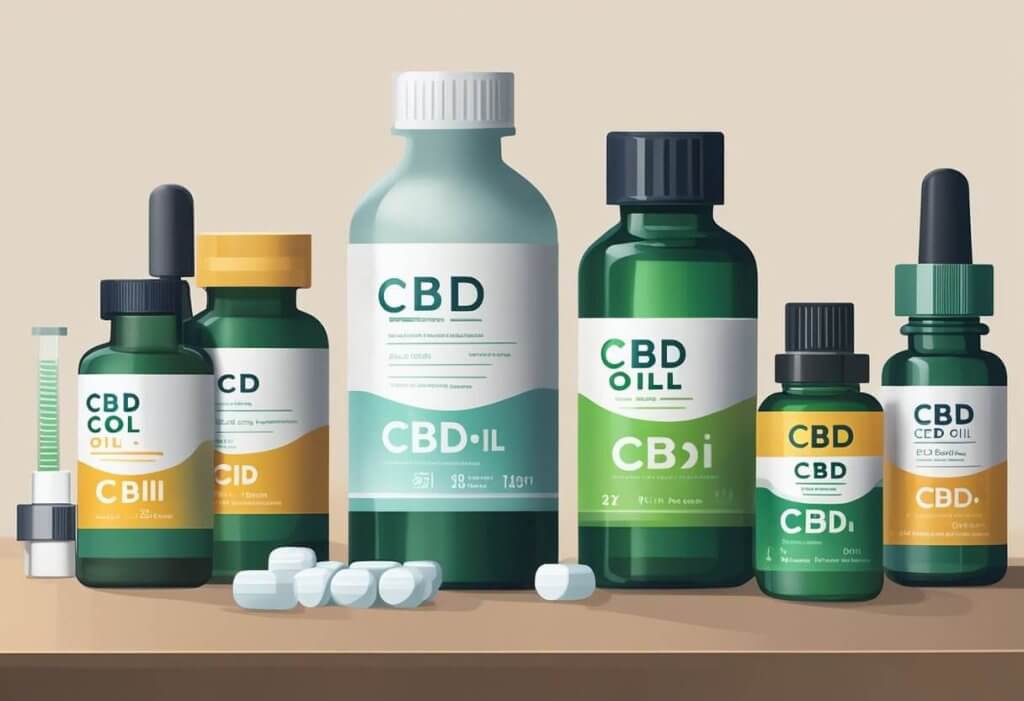What You Need to Know
Disclaimer: The anecdotal benefits of CBD mentioned on this website are based on preliminary research and individual user experiences. All information presented here is not meant to substitute for or replace information from health care practitioners. Please click here for our full disclaimer, including side effects, FTC position, etc.
The popularity of cannabidiol (CBD) continues to grow, as does the conversation around its safety. CBD is a non-psychoactive compound found in cannabis plants. It has been recognized for its potential therapeutic benefits, which have prompted many to incorporate it into their daily wellness routines. However, because it can alter the way the body metabolizes certain medications, understanding drug interactions with CBD is crucial for ensuring safety.

Given the complexity of the human body’s drug metabolism systems, there are valid concerns about the concomitant use of CBD and prescription medications. While further research is required to fully understand the scope of CBD’s interactions with other drugs, preliminary studies and anecdotal evidence suggest that caution should be exercised. Health professionals are increasingly advising patients to monitor these interactions to avoid diminished efficacy of their medications or heightened side effects.
Key Takeaways
- CBD may affect how the body processes various medications, necessitating caution.
- Research on CBD’s drug interactions is ongoing, emphasizing the importance of consulting healthcare providers.
- Users should be aware of potential changes in medication effectiveness or side effects when taking CBD.
CBD Interactions with Medications

When individuals use Cannabidiol (CBD), they should be aware of possible interactions with other medications they might be taking. CBD is metabolized in the body by enzymes that also metabolize many common drugs. The main family of enzymes involved is called cytochrome P450 (CYP450). If CBD inhibits, induces, or is metabolized by these enzymes, it can alter how other drugs are processed in the body, potentially leading to changes in their effectiveness.
One group of medications that can be affected are blood thinners. For instance, warfarin’s effectiveness may be increased by CBD, possibly raising the risk of bleeding. Similarly, certain medications used to control seizures, including clobazam, lamotrigine, and valproate, are processed by the same enzymes as CBD, which could affect their therapeutic levels.
Furthermore, there are drugs for controlling heart rhythm, like amiodarone, and thyroid medications, such as levothyroxine, that could interact with CBD. Individuals taking these should monitor their conditions closely.
Lastly, antidepressants and blood thinners are also mentioned with caution regarding their use with CBD due to the possibility of altered effects.
| Medication Type | Potential Interaction with CBD |
|---|---|
| Blood thinners | Increased risk of bleeding |
| Seizure medications | Altered therapeutic levels |
| Heart rhythm drugs | Irregular efficacy |
| Thyroid medications | Changes in hormone levels |
For a comprehensive list of known interactions, individuals might want to visit Cannabidiol Interactions Checker.
It’s essential that individuals consult healthcare providers before using CBD, especially if they are on other medications. They should not adjust or discontinue prescribed medications without professional advice.
Potential Risks and Considerations

When it comes to CBD, it’s not just about the potential benefits. One must consider the possible safety concerns and drug interactions that could arise, especially for individuals using other medications or belonging to special populations like older adults or those with chronic pain.
Common Drug Interactions with CBD
CBD has been noted for its effects on anxiety, epilepsy, and pain management. However, it can have significant interactions with various medications such as blood thinners like warfarin, antidepressants, benzodiazepines, and opioids, which are commonly used for managing pain and psychological conditions. Pharmacists and doctors always need to be informed about a patient’s CBD use as it may influence the enzymes that metabolize these drugs.
- Warfarin: Patients using warfarin may experience altered blood levels.
- Antidepressants: CBD could potentially alter the effectiveness of certain antidepressants.
- Benzodiazepines: Concurrent use might heighten sedation.
- Opioids: There’s a risk for increased sleepiness or respiratory depression.
- Statins: Used for cholesterol management, these could be affected by CBD.
- Clobazam: Often used in epilepsy, levels can become elevated when used with CBD.
CBD Use and Special Populations
Certain groups require extra vigilance when considering CBD. Older adults might be more susceptible to adverse side effects due to polypharmacy (the use of multiple medications). Those with conditions like epilepsy may find CBD beneficial but must manage potential interactions with seizure medications such as clobazam. Additionally, individuals using CBD for chronic pain must be cautious, especially if they’re also consuming substances like alcohol, which can further impact the liver and increase drowsiness or sedation. Safety and side effects should always be a top concern, so regular consultations with healthcare providers are critical to ensuring well-being.
Frequently Asked Questions
When combining CBD with other medications, one should be mindful of potential interactions that may affect the efficacy and safety of their treatment regimen.
What should I watch out for when taking CBD with blood pressure meds?
Individuals should monitor for any changes in blood pressure levels because CBD may affect how the body processes certain blood pressure medications.
Can I use CBD oil safely while on statins like Atorvastatin?
CBD may interact with statins like Atorvastatin, potentially altering the statin’s intended effects. It’s important to consult with a healthcare provider before using CBD with statins.
Any known issues when combining CBD with common pain relievers like Ibuprofen?
One should be cautious as CBD might enhance the effects of pain relievers such as Ibuprofen, which could increase the risk of side effects.
How does CBD oil impact my use of blood thinners or heart medications?
People taking blood thinners or heart medications should be particularly vigilant because CBD can affect the metabolism of these drugs, as noted in research from Harvard Health.
Should I be concerned about CBD if I’m taking medication for anxiety?
Because CBD may influence the metabolism of anxiety medications, it could potentially alter their effectiveness. It’s advisable to consult with a healthcare professional.
Is there a risk to my liver or kidneys when using CBD products?
There may be risk factors for one’s liver or kidneys when using CBD. This is especially true in higher dosages. This is due to the compound’s influence on enzymes that process many drugs.
